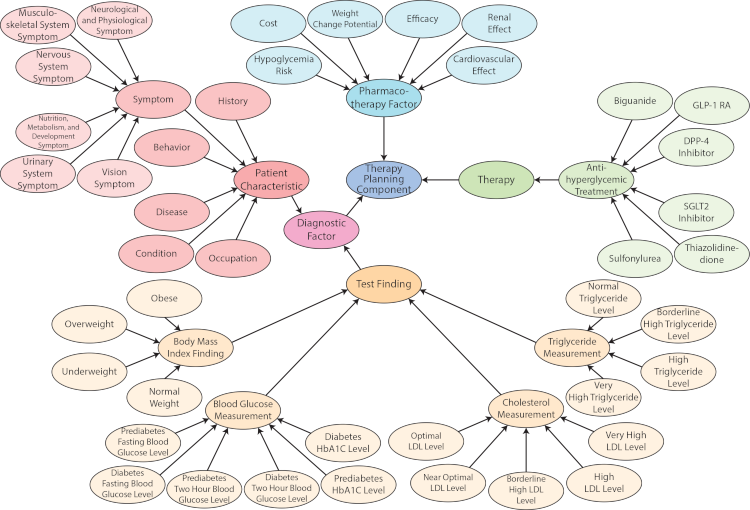
The Diabetes Pharmacology Ontology (DPO) is an ontology designed to support multimodal clinical reasoning for the diagnosis and treatment of diabetes.
Multiple forms of reasoning are supported by creating a concise (rather than complete and comprehensive) ontology, achieved by using an agile design methodology and following the Minimum Information to Reference an External Ontology Term (MIREOT) principle when linking to concepts from external vocabularies.
Included in DPO are diagnostic factors, therapies, and pharmacotherapy factors.
These three top-level concepts are encoded as subclasses of the root concept, therapy planning components.
Diagnostic factors include both patient characteristics, like behavior, symptoms, and history, as well as test findings, such as body mass index, blood glucose-related measurements, and cholesterol levels.
Therapies include common treatments for type 2 diabetes, such as biguanides (e.g. metformin), sulfonylureas, and GLP-1 RAs.
Pharmacotherapy factors include the cost of therapy, efficacy, weight change potential, and associated risks.
- Nananukul, N., & Kejriwal, M. (2023). HALO: An Ontology for Representing Hallucinations in Generative Models. arXiv preprint arXiv:2312.05209.
- Boborová, J., Balintová, I., Pukancová, J., & Homola, M. (2023). Merge, Explain, Iterate: A Combination of MHS and MXP in an ABox Abduction Solver.
- Rashid, S. M. (2023). Employing Ensemble Reasoning to Support Clinical Decision-Making (Doctoral dissertation, Rensselaer Polytechnic Institute).
- Rashid, S. M., McCusker, J., Gruen, D., Seneviratne, O., & McGuinness, D. L. (2023, May). A concise ontology to support research on complex, multimodal clinical reasoning. In European Semantic Web Conference (pp. 390-407). Cham: Springer Nature Switzerland.
